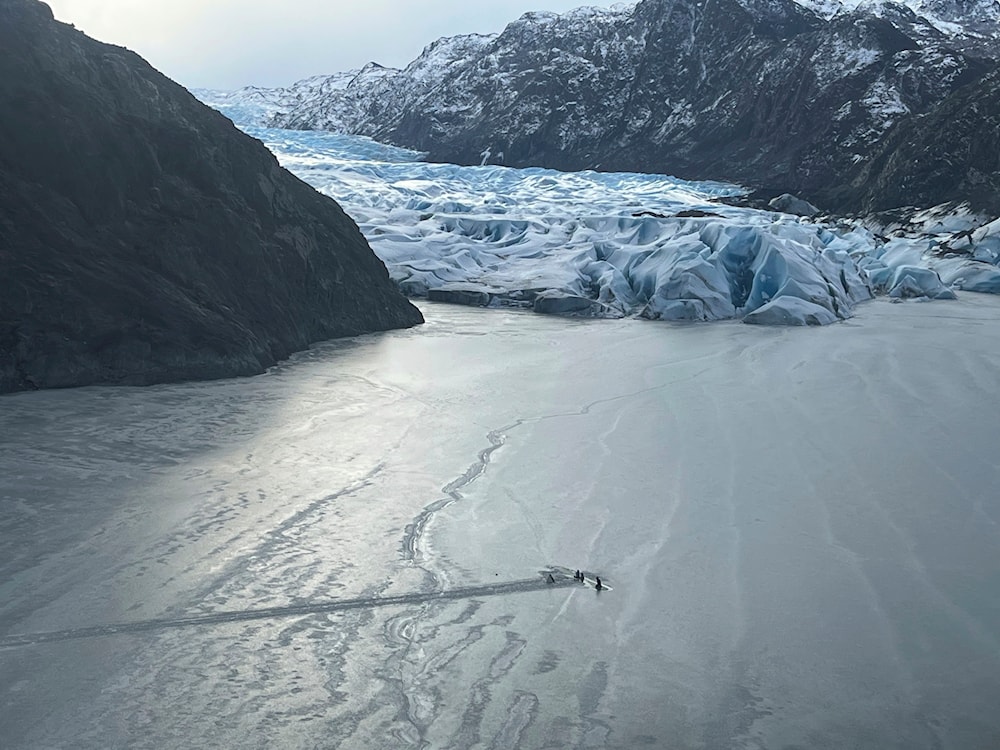Glacier melt due to climate change could erase 40% globally
A new global study warns that melting glaciers will fuel sea level rise, devastate ecosystems, and threaten billions who depend on glacial water for survival.
-

This photo provided by the Alaska National Guard shows an airplane partially submerged into the ice of Tustumena Lake at the toe of a glacier on Monday, March 24, 2025, near Soldotna, Alaska. (Alaska National Guard via AP)
A comprehensive scientific study has warned that nearly 40% of the world's glaciers are already set to vanish due to climate-heating fossil fuel emissions, with little chance of recovery. The study, published in Science, reveals that if the planet continues on its current path toward 2.7°C of global warming, as many as 75% of glaciers could disappear entirely in the coming centuries.
This rapid glacier melt due to climate change will drive global sea level rise, endanger food and water security for billions, and severely disrupt ecosystems and economies that rely on glacier-fed resources. Researchers estimate that every tenth of a degree of warming prevented could save the equivalent of 2.7 trillion tons of ice.
“We now see with alarming clarity that every fraction of a degree matters,” said Dr. Harry Zekollari of Vrije Universiteit Brussel, a co-leader of the study. “The decisions we make today will echo for centuries, defining how much of our glaciers survive.”
2.7°C warming could destroy up to 75% of glaciers
Drawing on eight glacier models and real-world observational data, the team assessed the future of the world’s glaciers, excluding those in Greenland and Antarctica. Extending the analysis beyond the year 2100, the study found that glacier loss projections have grown drastically, nearly double earlier estimates, which had put irreversible melting at only 20%.
Glaciers in regions like the western United States and Canada are among the most severely affected, with a projected 75% loss. By contrast, glacier systems in the Hindu Kush and Karakoram mountains show more resilience, although they too are expected to shrink significantly.
The disparities are stark: southern Arctic Canada is projected to lose 80% of its glacier mass, while the western Hindu Kush-Karakoram-Himalaya region might see just 5% inevitably lost. At a 2.7°C temperature rise, 18 out of 19 glacier regions globally are forecast to lose at least 80% of their glacial coverage.
Regional glacier loss varies, with Arctic hardest hit
The study highlights dramatic regional variation in glacial retreat and climate vulnerability. Iceland, the Russian Arctic, and the western United States face nearly total glacial collapse under high-emission scenarios. These regions could see entire glacier systems disappear, reshaping landscapes and triggering environmental crises.
According to Dr. Lilian Schuster of the University of Innsbruck, co-author of the study, “Glaciers are excellent indicators of climate change because their retreat is visible and undeniable. It’s not too late to act now — every tenth of a degree matters to limit this damage.”
The study predicts that doomed glaciers alone could raise sea levels by 11 centimeters, with the number increasing to 23 centimeters if warming hits 2.7°C. The result would be devastating for low-lying coastal communities, infrastructure, and ecosystems already under stress.
Sea levels, agriculture, and tourism face massive disruption
The consequences of glacier melt due to climate change stretch far beyond the mountains. The anticipated global sea level rise will place millions of coastal residents at heightened risk of flooding and displacement. Communities dependent on glacial meltwater for irrigation, drinking supplies, and hydroelectric power face existential threats to their survival.
The disappearance of glaciers also raises the risk of glacial lake outburst floods, poses a danger to downstream settlements, and threatens entire industries, especially glacier-dependent tourism economies across the Alps, Rockies, and Himalayas.
While long-term data gaps remain, particularly for earlier centuries, Dr. Zekollari noted that glaciers were dramatically larger in the 19th century. “Glaciers were way bigger in 1850 than they are today,” he said.
Every fraction of a degree matters, scientists stress
Climate experts praised the study’s integrated modeling approach. Professor Andrew Shepherd of Northumbria University described glaciers as “the most iconic example of the impacts of climate change,” emphasizing that “glacier melting will continue for centuries, even if climate warming stops today.”
He warned that continued reliance on fossil fuels would render mountain landscapes unrecognisable, a point echoed by the research team. Zekollari concluded with a stark reminder of fossil fuel emissions' impact, “Everything is connected. If you drive around in your car in the UK, you’re emitting greenhouse gases and this helps melt a glacier maybe 10,000km away… The oceans then rise, so you’ll have to have better coastal defences and that will cost a lot of taxpayers money.”
These findings were released in advance of the UN High-Level International Conference on Glaciers’ Preservation, which begins this week in Tajikistan as part of the International Year of Glaciers’ Preservation. The timing is urgent, underscoring the need for coordinated global action to confront the cascading consequences of rising temperatures.
Read next: Swiss glacier collapse buries Blatten village in mud and rock

 5 Min Read
5 Min Read











